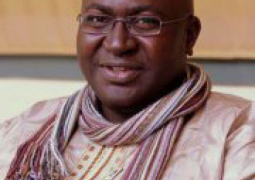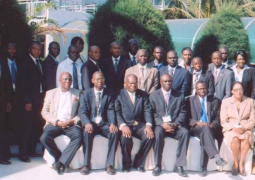
Senior Magistrate Lamin Mbai of the Banjul Magistrates’ Court yesterday ordered one Mansa Bah, who stood as surety for Fatou Camara, to pay the D1million bail bond to the state.
This was after Fatou Camara, host of the famous Fatou Show on GRTS television, was reported to have absconded from the jurisdiction.
It would be recalled that Fatou Camara, former Director of Press and Public Relations at the Office of the President in Banjul, was arraigned before the court and charged with alleged spreading of false news and publication of false news.
In his testimony, to show cause why he should not forfeit the bail bond, Mansa Bah told the court that he resides at the Brusibi housing estate phase 2, and that he is a businessman.
“I know Fatou Camara. The husband is my friend and also my business partner. The reason why I bailed Fatou Camara is that my friend, Yusupha Saidy, called me and informed me that her wife was going to court; so I can stand for her as surety before the next adjournment date,” Mansa Bah said.
He said when Fatou Camara was released on bail, they spoke on the phone, and she congratulated him and said her husband, who was at the time out of the country, was coming the following day.
“During the telephone conversation, she told me that when her husband arrived, he will substitute my papers and replace his papers in court,” he said.
“I met the husband and he honestly told me that he was aware of the efforts and role I played for his wife to be released on bail,” Bah added.
He said he then called Fatou Camara on her Gamcel line to inform her that he (Mansa Bah) wanted to visit her at her compound, but Fatou told him that she had travelled to Senegal, and would surely be back before the next adjournment date.
“I went to see the husband to inform him that I had bailed Fatou, and now she travelled to Senegal without my consent. The husband replied that he was not aware,” said Mansa Bah.
He added that the husband then called Fatou Cammara in Senegal and asked her why she travelled to Senegal without his consent, Fatou told the husband that she did try his phones, but they were all off, and that she would be back before the next adjournment date.
The husband further told her not to fail to come before the next adjournment date, which she agreed to, Bah continued.
Mr. Bah also told the court that he proposed to Fatou Camara’s husband to go to Senegal to look for her, and convince her to come back.
Asked by his counsel whether he did have the proof that he travelled to Senegal to look for Fatou Camara, Bah replied that he has proof at the border, where he passed when going to Senegal.
He said upon his arrival in Dakar, “I did tell her I wanted to visit you where you are in Dakar, but Fatou told me that she did not know Dakar that much, and it will be hard for her to direct me to where she was staying. Fatou gave me an excuse,” he added.
“I then told her that ‘if you have panicked because of your case’, do not worry, I will try to settle it with your husband when we go back to The Gambia,” he stated.
‘‘I called her on Thursday, and she all her phones were off. I reported the matter to the police in Senegal; that I stood for her as surety and she was now absconding,” Mansa Bah revealed.
He added that the police gave him a reference number to call; that anywhere he saw her, he could try to arrest her and take her to the nearest police station in Dakar.
“The property I bailed her for is where I stay with my two wives, six children and some of my brothers in Brusibi housing estate,” he said.
Asked by his counsel whether he was aware, when he bailed the accused person, that she could flee out of the jurisdiction, Mansa Bah told the court that he never thought of that; otherwise he would not have bailed her in the first place.
Under cross-examination by the state counsel A. Bah, who asked the witness whether he was aware of the consequence of bailing someone who absconds, Mansa Bah told the court that he did not know, and he did it because of his relationship with the husband.
When further asked whether he wanted the court to believe that he did know the consequence of bailing someone, the surety replied that all what he knew was that the husband called him and asked him to bail her, which he did with a clear conscience.
In his ruling, the trial magistrate told the court that the laws of The Gambia are very clear that, ‘if you are surety to someone and he or she failed to appear in court, the surety needed to pay the bail bond’.
He added that the surety here had made tremendous efforts to trace the accused person by travelling to Senegal.
He said it was a clear that the surety had done what he could in order to trace the accused person.
He, therefore, ordered the surety to pay the sum of D1million to the state within six months, starting from December 30.



